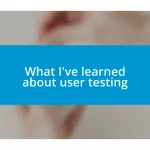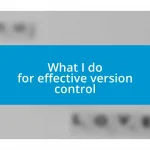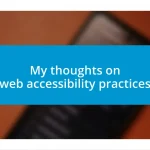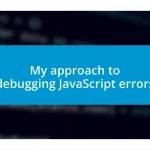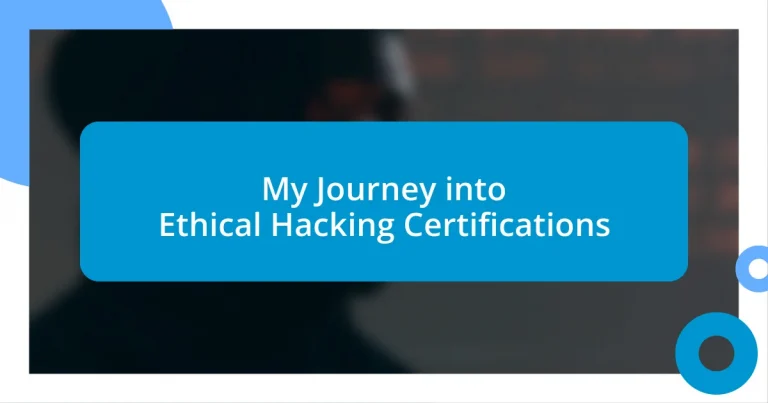Key takeaways:
- Ethical hacking certifications significantly enhance employability, boost confidence in handling security incidents, and foster a sense of community among professionals in the field.
- Hands-on experience is essential for mastering ethical hacking concepts, allowing for practical application of theoretical knowledge, which builds confidence and problem-solving skills.
- Continuing education and pursuing specialized certifications are vital for staying current in the dynamic field of cybersecurity, ensuring skills remain relevant and enhancing career prospects.
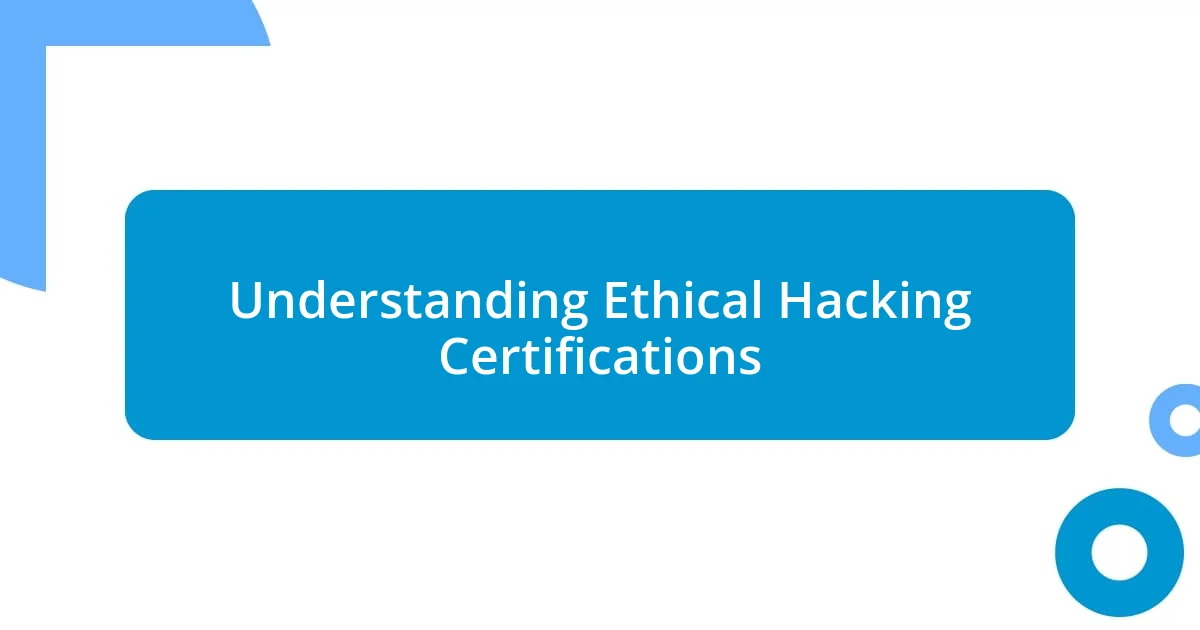
Understanding Ethical Hacking Certifications
Ethical hacking certifications are essential for anyone aspiring to work in cybersecurity. I remember the moment I decided to pursue my first certification; it felt like unlocking a door to a world filled with opportunities. Each certification not only validates your skills but also opens pathways to connect with like-minded professionals.
When I was preparing for the CompTIA Security+ exam, I was overwhelmed yet excited. The breadth of knowledge required was daunting, but I realized it offered me a chance to understand the importance of securing digital information in today’s landscape. Isn’t it fascinating how these certifications can equip you with the tools to combat real-world cyber threats?
Having these certifications on your resume can significantly boost your credibility. I can’t tell you how often someone’s eyes lit up when I mentioned my Certified Ethical Hacker (CEH) credential during interviews. It’s a powerful conversation starter, allowing me to share not just what I know, but my passion for protecting networks and systems. Have you experienced that sense of pride when your achievements resonate with others? It’s an incredible feeling that ethical hacking certifications can provide.
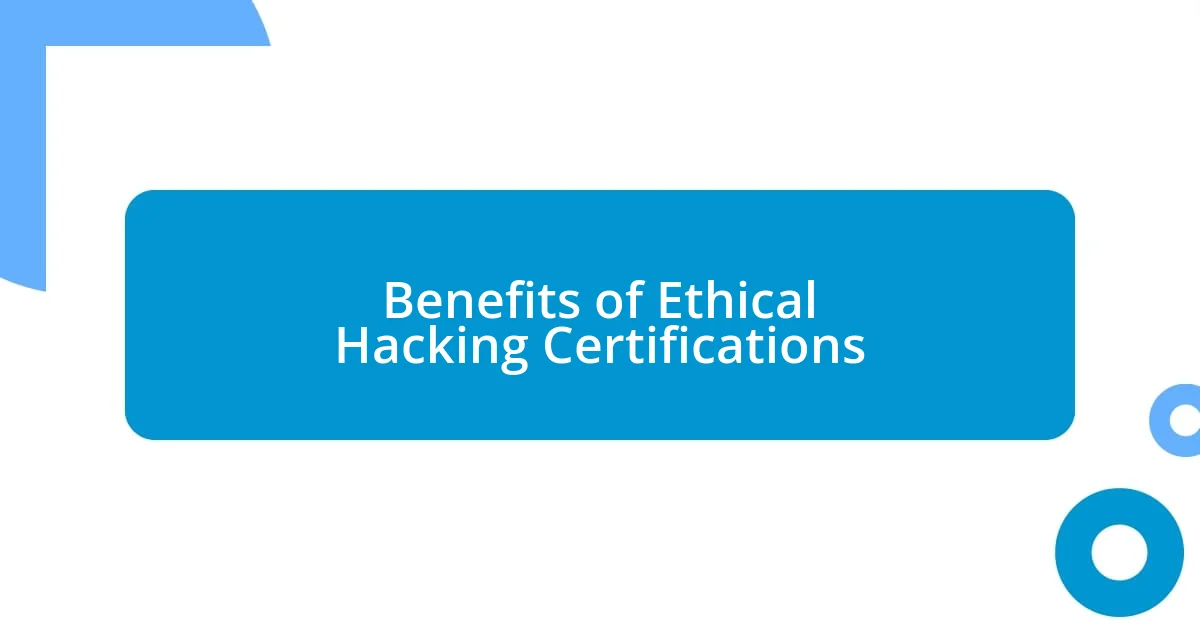
Benefits of Ethical Hacking Certifications
The benefits of ethical hacking certifications are numerous and impactful. For one, these certifications greatly enhance employability in a competitive job market. I remember a colleague who secured a job offer right after earning his Certified Information Systems Security Professional (CISSP). The recruiter mentioned that the certification set him apart from other candidates. It’s remarkable how just a few letters on a resume can lead to tangible opportunities.
Furthermore, ethical hacking certifications provide a structured pathway for learning advanced skills. I often think back to the moment I grasped complex concepts while studying for the Certified Ethical Hacker (CEH) exam. That knowledge not only deepened my understanding of cybersecurity but also boosted my confidence in handling security incidents. Isn’t it awesome how targeted education can transform our professional capacity?
In addition to job prospects and skill enhancement, these certifications instill a sense of community. When I attended a cybersecurity conference, I felt a sense of belonging among fellow certified professionals who shared similar experiences. Sharing stories about passing exams and tackling real-life challenges turns into fruitful networking opportunities. It’s more than just certifications; it’s about joining a movement to safeguard the digital world.
| Benefit | Description |
|---|---|
| Increased Employability | Certifications make candidates stand out to employers, often leading to job offers. |
| Skill Enhancement | Provides comprehensive knowledge and boosts confidence to tackle cybersecurity challenges. |
| Community Networking | Connects you with like-minded professionals, fostering collaboration and support. |
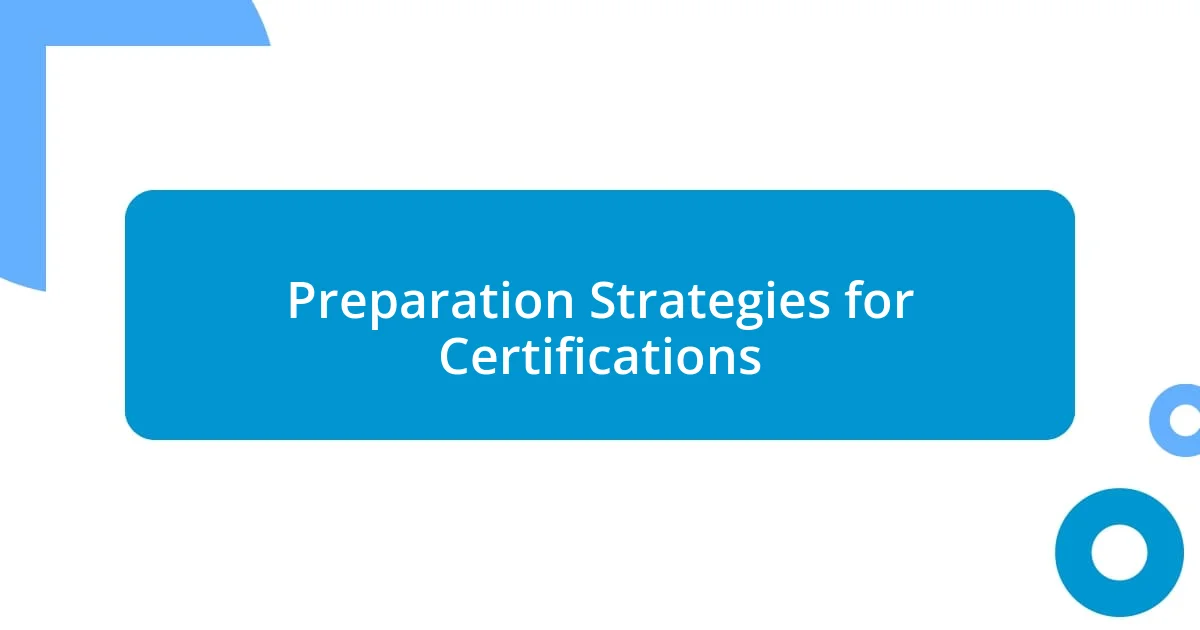
Preparation Strategies for Certifications
Preparation Strategies for Certifications
Approaching your certification preparation can feel overwhelming, especially with the amount of information out there. Personally, I found that breaking down the material into manageable chunks made a significant difference. Instead of trying to tackle everything at once, I created a study schedule that allowed me to focus on specific topics each week without feeling rushed. This strategy not only kept me organized but also helped me retain the information better.
To make your preparation process more effective, consider these strategies:
- Set Specific Goals: Define what you want to achieve each study session—this keeps you focused and motivated.
- Utilize Practice Exams: Taking practice exams can familiarize you with the question format and help identify areas needing improvement.
- Join Study Groups: Surrounding yourself with others preparing for the same exam offers support and insights, which can enhance your understanding of the material.
- Incorporate Hands-On Labs: Practical experience is invaluable. Engaging in labs or simulations can build your confidence and apply learned concepts in real-world scenarios.
- Stay Consistent: Regular study sessions, even if they’re short, can be more effective than cramming. I found that consistency helped me build a routine, making study time something I looked forward to rather than dreaded.
One thing I learned on my journey is that it helps to integrate a variety of learning resources. I often mixed books with online courses and video tutorials for a more rounded approach. It’s amazing how different perspectives illuminate concepts, making them feel more relatable. By exploring multiple materials, I not only understood the theoretical aspects but also how to apply them practically. Tailoring my study methods to fit my learning style ignited a genuine curiosity for the field, and it’s that passion that fueled me through the inevitable challenges.
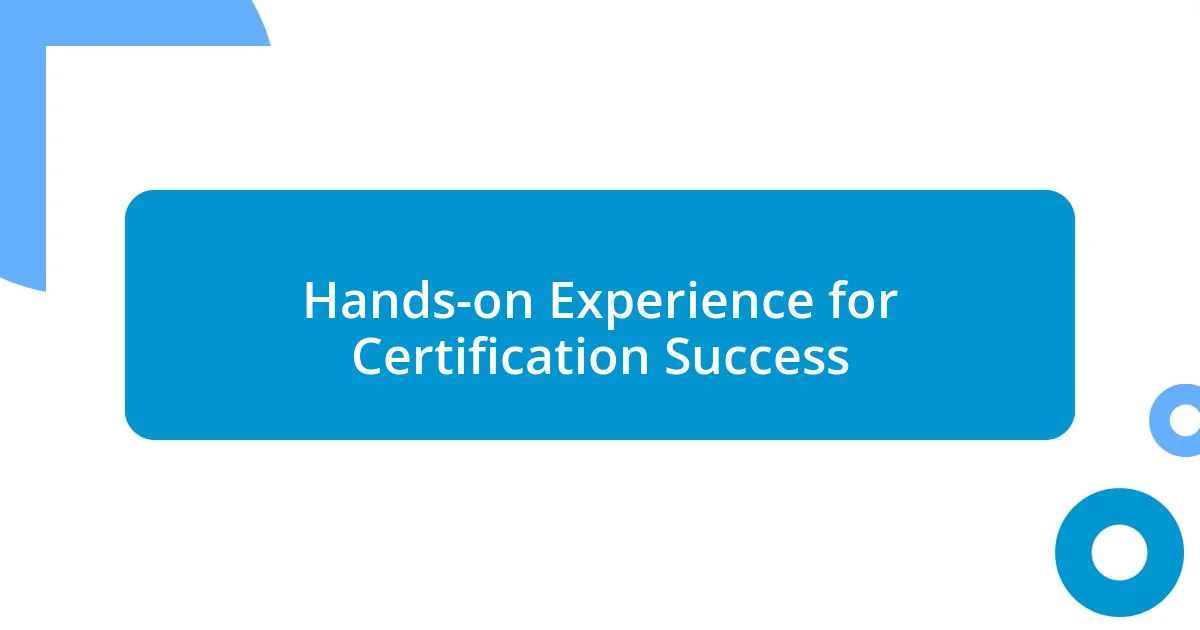
Hands-on Experience for Certification Success
Hands-on experience is often the cornerstone of success in ethical hacking certifications. I vividly recall spending hours in my home lab, setting up various operating systems and security tools. That tactile engagement was crucial—it not only reinforced my theoretical knowledge but also allowed me to troubleshoot in real-time. Have you ever tried to solve a problem without any practical exposure? It can be incredibly frustrating, right? The hands-on practice I had helped me navigate those moments with ease.
When I was preparing for my CEH exam, I enrolled in several practical labs, where I could simulate real-world hacking scenarios in a safe environment. One of my favorite experiences was penetrating a simulated network, piecing together vulnerabilities, and then documenting my findings as if it were a professional audit. This not only solidified my learning but also gave me a taste of what to expect in the field. It’s fascinating how these experiences translate into skills that are directly applicable in a workplace setting.
Moreover, having hands-on experience cultivates a depth of confidence that theoretical study simply can’t match. I remember feeling a sense of accomplishment after successfully completing a complex penetration test in a lab. That moment fueled my passion for the field and solidified my ambitions. Isn’t it empowering to know that you can apply what you’ve learned in a tangible way? Engaging directly with the material allows us to grasp the intricacies of ethical hacking, making future challenges feel far less daunting.
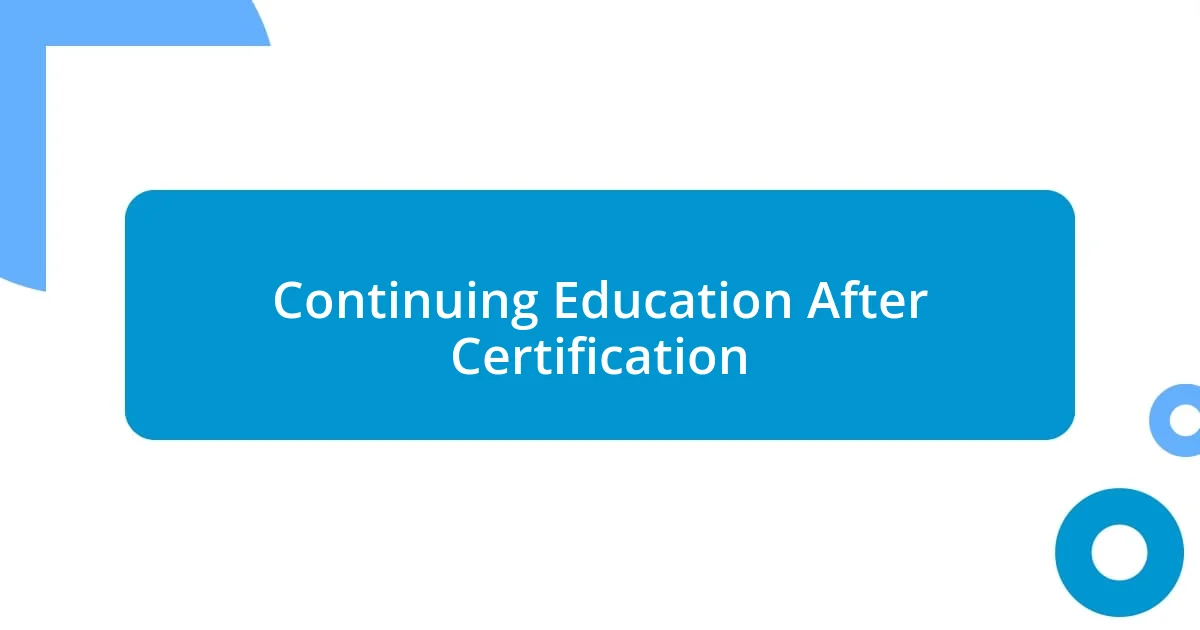
Continuing Education After Certification
Continuing education after obtaining an ethical hacking certification is vital in this ever-evolving field. I’ve often found that new vulnerabilities and technologies pop up constantly, and staying informed about these changes is not just beneficial—it’s essential. Joining industry forums and attending conferences has allowed me to learn from experts and expand my network, which in turn keeps my skills sharp and relevant.
I’ve also taken a few specialized online courses since earning my certification. It’s intriguing how these platforms offer focused insights on emerging tools and techniques that may not have been included in my initial studies. For instance, one course delved into the latest in cloud security, which opened my eyes to new best practices. Have you ever taken an online course that completely shifted your perspective? For me, that experience was a game-changer.
Moreover, I actively pursue certifications that dive deeper into niche areas of ethical hacking, such as penetration testing and incident response. Each new credential not only enhances my resume but enriches my knowledge bank. I remember how proud I felt after successfully completing a certification that was particularly challenging. That sense of accomplishment, combined with the skills I gained, fueled my desire to keep going. It’s like building a toolbox filled with tools—I want my toolbox to be brimming with the best equipment to tackle whatever challenges come my way.
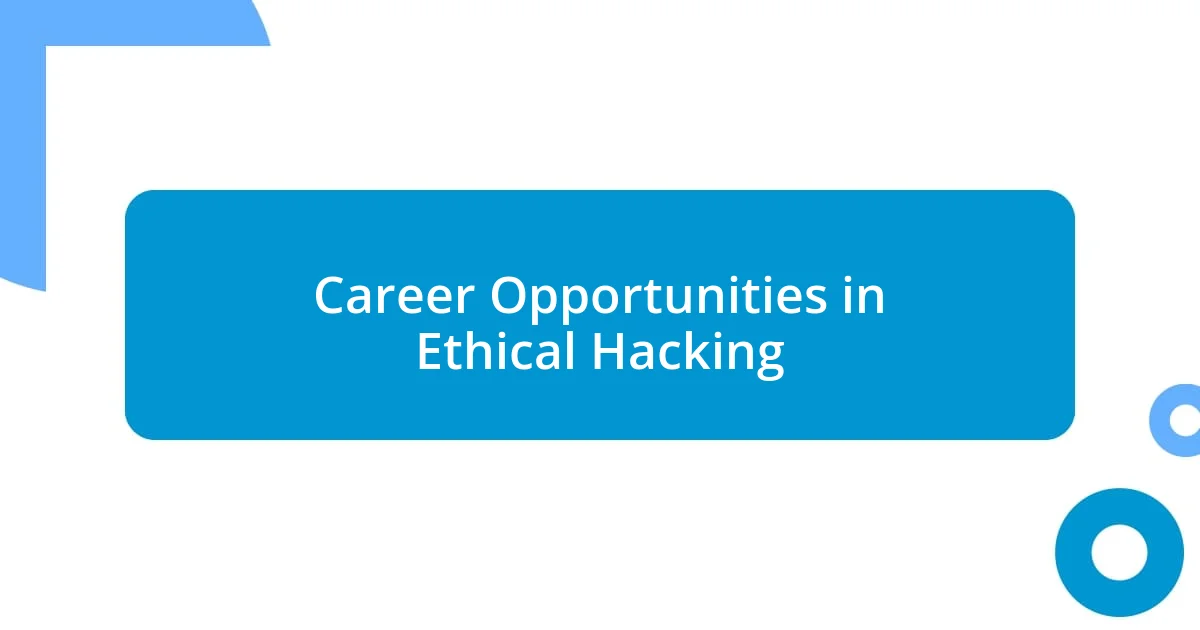
Career Opportunities in Ethical Hacking
Ethical hacking offers a plethora of career opportunities that span across various industries. I’ve witnessed firsthand the demand for cybersecurity professionals grow exponentially. After I earned my certification, I explored roles not just as a penetration tester but also in areas like incident response and security consulting. What surprised me the most was how companies were eager to invest in security talent—turning what seemed like a niche role into a mainstream career path.
In my own journey, I found immense satisfaction in applying my skills to real-world problems. I once took on a freelance project where I helped a local business assess their vulnerability to cyber threats. It was rewarding to see how my knowledge translated into practical solutions that genuinely improved their security posture. Have you ever experienced the rush of transforming theoretical concepts into tangible benefits? In ethical hacking, every challenge you overcome can directly affect a company’s operations and security stance.
Moreover, industries like finance, healthcare, and even retail have increasingly prioritized cyber resilience, creating diverse job openings. I often reflect on how the blend of technology and ethics within this field allows for a meaningful career. With regulatory compliance becoming stricter, roles like compliance analyst and risk assessment manager are also gaining prominence. Isn’t it fascinating to think about the multitude of paths one can take in a field that is so essential now? Each opportunity not only empowers us professionally but also enhances our ability to safeguard systems that touch everyday lives.
